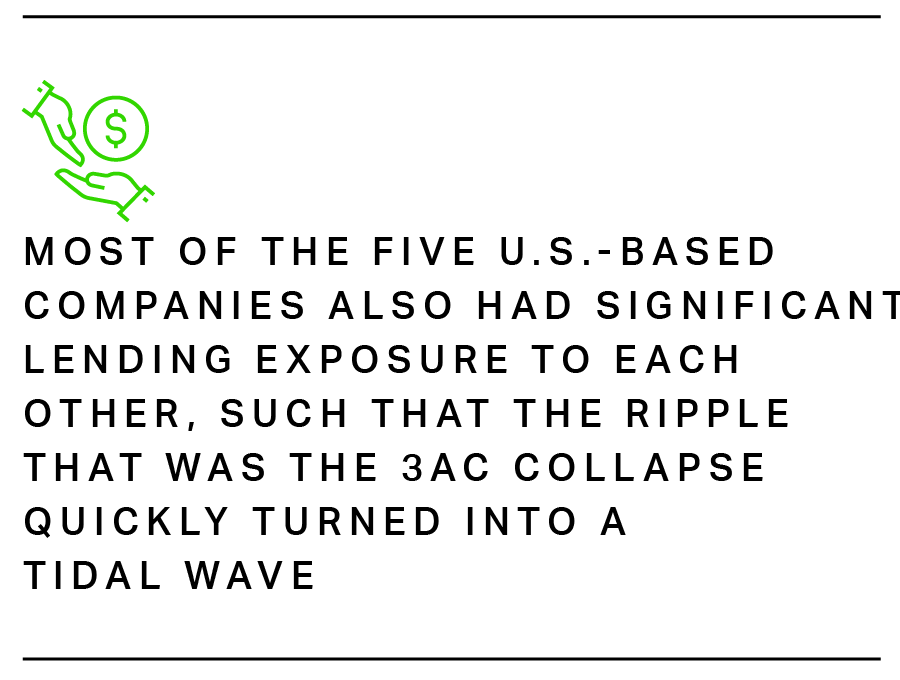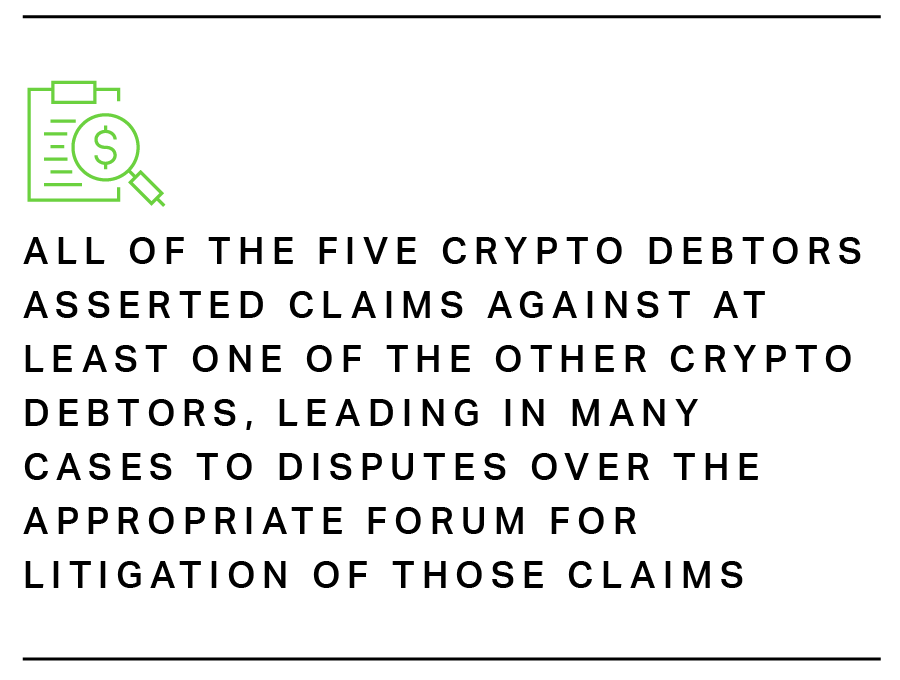
The past two years have seen a cluster of interrelated Chapter 11 bankruptcy cases involving five major U.S.-based cryptocurrency companies: Voyager Digital, a cryptocurrency brokerage; Celsius Network, a crypto exchange; FTX and Alameda Research (FTX), a crypto exchange and hedge fund respectively; BlockFi, a crypto lender; and Genesis Global, a crypto lender.
The domino effect that ultimately led to the filing of these five major U.S.-based crypto companies began in 2022, after the crypto market fell by approximately two-thirds in the first half of the year, and the BVI-based crypto hedge fund Three Arrows Capital (3AC) collapsed. 3AC’s failure led to losses for Voyager, Celsius, FTX, BlockFi, and Genesis, which all had significant lending exposure to 3AC. Most of the five U.S.-based companies also had significant lending exposure to each other, such that the ripple that was the 3AC collapse quickly turned into a tidal wave which led (together with other market disruptions) to the other U.S.-based crypto companies freezing withdrawals by customers and repayments to lenders and/or imposing strict trading limitations. This eventually led them to initiate Chapter 11 proceedings.


The past two years have seen a cluster of interrelated Chapter 11 bankruptcy cases involving five major U.S.-based cryptocurrency companies: Voyager Digital, a cryptocurrency brokerage; Celsius Network, a crypto exchange; FTX and Alameda Research (FTX), a crypto exchange and hedge fund respectively; BlockFi, a crypto lender; and Genesis Global, a crypto lender.

The domino effect that ultimately led to the filing of these five major U.S.-based crypto companies began in 2022, after the crypto market fell by approximately two-thirds in the first half of the year, and the BVI-based crypto hedge fund Three Arrows Capital (3AC) collapsed. 3AC’s failure led to losses for Voyager, Celsius, FTX, BlockFi, and Genesis, which all had significant lending exposure to 3AC. Most of the five U.S.-based companies also had significant lending exposure to each other, such that the ripple that was the 3AC collapse quickly turned into a tidal wave which led (together with other market disruptions) to the other U.S.-based crypto companies freezing withdrawals by customers and repayments to lenders and/or imposing strict trading limitations. This eventually led them to initiate Chapter 11 proceedings.




At the same time, regulatory scrutiny on each of the five U.S.-based companies increased. The U.S. Securities and Exchange Commission (SEC), U.S. Department of Justice (DOJ), Federal Trade Commission (FTC), and Commodity Futures Trading Commission (CFTC), among others, brought investigations that led in some cases to criminal charges and in all cases to substantial civil claims to be administered in the respective companies’ Chapter 11 cases.
During the reorganization of the five U.S.-based companies, crypto prices remained volatile: Bitcoin, the value of which serves as an indicator for the health of the crypto market as a whole, rose from a nadir of less than $17,000 in mid-2022 through early 2023 to approximately $44,000 in early 2024, and today sits at more than $65,000.

As of June 2024, BlockFi, Celsius, Genesis, and Voyager have all confirmed Chapter 11 plans.
Voyager’s Chapter 11 plan, which was the first to be confirmed in March 2023, provided for a wind-down of the company’s operations after a sale to FTX fell through in November 2022 as a result of FTX’s Chapter 11 filing.
BlockFi’s Chapter 11 plan, confirmed in October 2023, provided for a wind-down of its business and continued pursuit of claims against 3AC and FTX for the benefit of creditors.
Celsius’ plan, confirmed in November 2023, provided for a spin-off sale of its mining business to a new entity to be owned by its customers, and a wind-down of the rest of its business.
Genesis’ plan, confirmed in May 2024, provided for a liquidation and wind-down of the company, with claims against its parent company Digital Currency Group to be preserved for the post-wind-down entity to pursue for the benefit of creditors. The FTX debtors have proposed a Chapter 11 plan that has not yet been confirmed but is not expected to garner objections from any major creditor groups.
The Chapter 11 cases of these five U.S.-based crypto companies presented three major novel issues for bankruptcy courts and practitioners. These included issues relating to inter-debtor claims, claims by regulators and other government entities, and the Bankruptcy Code’s “dollarization” provision, each of which is described in more detail below.
Inter-Debtor Claims and the Automatic Stay
The automatic stay in a Chapter 11 case prevents claimants from bringing claims against a debtor in any forum other than the court that is overseeing the debtor’s case. Claimants may obtain relief from the automatic stay to bring a claim in another forum, but the bar for granting such relief is high. Debtor-on-debtor claims present a unique challenge to this framework, because a debtor-claimant that might ordinarily bring a claim (for instance, a fraudulent conveyance or preference claim) as an adversary proceeding in its own court must, where the defendant is also a Chapter 11 debtor, seek leave from the automatic stay from the court overseeing the debtor-defendant’s case.
All of the five crypto debtors asserted claims against at least one of the other crypto debtors, leading in many cases to disputes over the appropriate forum for litigation of those claims. Although Chapter 11 cases sometimes come in industry clusters like the crypto cases did, these clusters generally do not involve inter-debtor claims to the degree seen here. The issue was not ultimately litigated to a judicial resolution in any of the cases in which it arose, and was instead mooted by settlements, underscoring the intractability of the conflict and the lack of clear guidance in the Bankruptcy Code or the automatic stay case law.

Inter-Debtor Claims and the Automatic Stay
The automatic stay in a Chapter 11 case prevents claimants from bringing claims against a debtor in any forum other than the court that is overseeing the debtor’s case. Claimants may obtain relief from the automatic stay to bring a claim in another forum, but the bar for granting such relief is high. Debtor-on-debtor claims present a unique challenge to this framework, because a debtor-claimant that might ordinarily bring a claim (for instance, a fraudulent conveyance or preference claim) as an adversary proceeding in its own court must, where the defendant is also a Chapter 11 debtor, seek leave from the automatic stay from the court overseeing the debtor-defendant’s case.

All of the five crypto debtors asserted claims against at least one of the other crypto debtors, leading in many cases to disputes over the appropriate forum for litigation of those claims. Although Chapter 11 cases sometimes come in industry clusters like the crypto cases did, these clusters generally do not involve inter-debtor claims to the degree seen here. The issue was not ultimately litigated to a judicial resolution in any of the cases in which it arose, and was instead mooted by settlements, underscoring the intractability of the conflict and the lack of clear guidance in the Bankruptcy Code or the automatic stay case law.

Government Claims
All five of the crypto Chapter 11 cases were also shaped in large part by government claims, the majority of which were settled either independently or in connection with Chapter 11 plans.
Multiple regulator settlements, including those between the FTC and both of Voyager and Celsius, between the New York Attorney General and Genesis, included permanent bans on those companies’ handling of customer funds or assets.
With respect to monetary settlements, several regulators agreed to plan treatment that subordinated the regulator’s claim to customer and other creditor claims against the relevant debtor, such that the regulator claim would be reduced or suspended dollar-for-dollar with the amount distributed by the debtor to its customers and other lenders. This construct, which was employed by the New York Attorney General in the Genesis case, the FTC in the Celsius case, and the IRS in the FTX case, among others, may provide a blueprint in the future for governmental or regulatory claims that are restitutionary in nature.

Government Claims
All five of the crypto Chapter 11 cases were also shaped in large part by government claims, the majority of which were settled either independently or in connection with Chapter 11 plans.
Multiple regulator settlements, including those between the FTC and both of Voyager and Celsius, between the New York Attorney General and Genesis, included permanent bans on those companies’ handling of customer funds or assets.

With respect to monetary settlements, several regulators agreed to plan treatment that subordinated the regulator’s claim to customer and other creditor claims against the relevant debtor, such that the regulator claim would be reduced or suspended dollar-for-dollar with the amount distributed by the debtor to its customers and other lenders. This construct, which was employed by the New York Attorney General in the Genesis case, the FTC in the Celsius case, and the IRS in the FTX case, among others, may provide a blueprint in the future for governmental or regulatory claims that are restitutionary in nature.

Dollarization
Perhaps the most novel aspect of the crypto Chapter 11 cases has been the large proportion of claims denominated in cryptocurrencies, rather than dollars or other fiat currency.
Section 502(b) of the Bankruptcy Code provides that claims to which an objection has been made shall be determined in dollars “as of the date of the filing of the petition,” but there exists little case law guidance on the implementation of this provision, and it was subject to disagreement between constituencies in several of the crypto Chapter 11 cases. This issue – whether claims denominated in crypto must be valued as of the relevant debtor’s petition date, or whether they should be valued as of some later date (resulting in most cases in a much higher valuation for crypto claims, given the rise in crypto prices over the course of 2023 and into 2024) – had significant implications for the plan process in each case.
The Voyager, Celsius, and BlockFi debtors confirmed plans without directly litigating the issue. The judge overseeing the FTX cases remarked that he understood Section 502(b) to require dollarization of cryptocurrency claims as of the petition date, but as yet has not had occasion to formally rule on the matter.
The FTX debtors have proposed a plan that would value claims as of the petition date.
The Genesis debtors proposed, and the court overseeing their cases confirmed, a plan that embodied a settlement with the debtors’ major creditor constituencies to make the majority of distributions in-kind, with the petition date value of each creditor’s claim serving only as a starting point for valuation of its ultimate distribution. The Genesis plan was challenged by the company’s prepetition equity holder, whose argument was dismissed on the grounds that it lacked standing given the impossibility of equity recovery in the cases, among other reasons.

